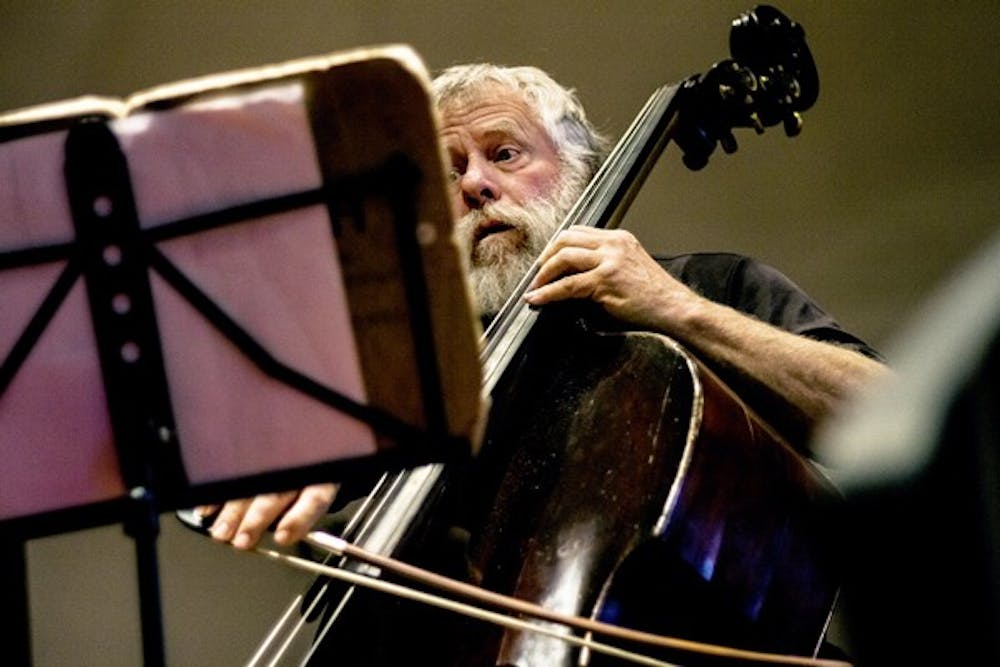Classical bassist Richard "Dobbs" Hartshorne brings messages to Mount Pleasant

St. John’s Episcopal Church received a message Friday evening: music can bring about a change of heart and convey a beacon of hope.
Internationally renowned classical bass player Richard “Dobbs” Hartshorne presented a Hope Through Music Concert-Lecture to share and playing music to the people who need it the most.
For the past seven years, Hartshorne has brought his classical music, stories and lectures to U.S. prisons, juvenile centers, orphanages, schools and people in war-torn countries including Iraq, Palestine, Afghanistan and Uganda. He also manages to travel to refugee camps.
“Everybody needs music, but some people need it more than others," Hartshorne said. "People in prison do, and people in Afghanistan and Iraq do. So, that’s been my focus."
Since the organization was founded in 2004, Bach With Verse has been a non-profit way of bringing inspiring stories, humor and music to those less fortunate. Hartshorne has been bringing BWV’s key mission to life by performing at an international level.
“Just let your mind wander,” Hartshorne said before starting his performance. “Go outside the prison, go to the Caribbean, go home or fall asleep. But the more you’re open to it, the bigger the experience you can have.”
Hartshorne encouraged the audience members not to clap between musical sets, but to hold their applause until after the set so they may feel the full experience.
Johann Sebastian Bach’s pieces were played live with a 1863 Luigi Cavalli upright bass from Milan, Italy. Hartshorne said the bass he used Friday is his favorite.
“I actually met a collector in Argentina, and he sold me seven different basses; this is my favorite,” Hartshorne said.
"Suite No. 1 in G major," consisting of "Prelude," "Allemande," "Courante,""Sarabande," Menuet I and II," and "Gigue," were played flawlessly over the four string, audience members granting his wishes of no clapping until the end.
“I’m the first person to play all six (pieces) on the bass, original key and original notes,” he said after his first performance while taking questions from the audience.
While some might assume classical music performances in prisons or juvenile detention centers might not go well, Hartshorne shared one surprising story that happened the previous day in Saginaw. After his usual performance, the troubled kids would stick around to ask questions.
"One of the girls came up to me afterwards and said, ‘You opened a new place in my heart, in music,'" Hartshorne said. "That makes it all worth it.”
For the second part of his presentation, Hartshorne played along on his bass and told a humorous story, “Another Fairytale." This story was about a birch tree that runs off to join the circus and would later ironically fall in love with a beaver.
Hartshorne said he does not know how the story ends, imagining several possible ways it could have ended, ranging from suicides, overcoming a witch’s spell, which he admits to never bringing up in the story, and building a formal agreement between beavers and trees that would bring peace between the two groups. The audience listened on in amusement.
Following the story, he presented the world premiere of "Poems from the Inside," sharing various stories of people he’s met over the years and through his travels, as well as “Go On," “Journey of Struggles" and “Sweet," three poems he’s collected from visiting prison inmates.
For the last sequence, Hartshorne wanted to show his short film, "Men in Cages," giving audience members a brief look into his 2010 California prison tour. The film was shown through slides and silent videos with his own commentary. He discussed the types of people he encountered, the feelings shared and the experience of bringing Bach’s music to inmates.
“I especially liked just the poetry part about it,” said Mount Pleasant resident Stephanie Radke, a CMU alum. “When you put music behind poetry like that, the combination of the two is just overpowering,” she said.
“I was very touched,” said Wayne Nicholson, priest and rector of St. John’s. “People in prison are kind of society’s throwaways. We lock them up, and we never have to see them again. And we forget that they are people. They are human beings, and they have souls. I believe they have the essence of God in them ... Maybe (Dobbs' music) helps remind the prisoners themselves that they are human and that somebody cares about them.”






